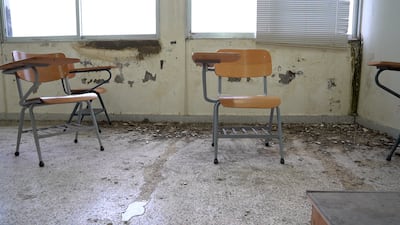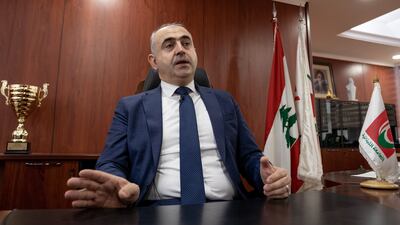Teaching IT classes without computers and electricity, using only pen and paper, might seem a contradiction in terms, yet it is the situation today facing students and teachers at the Lebanese University.
“It might sound ironic, computer classes without computers, but it is where we are now,” said Aya Furnoubi, 19, a social science student at the Saida branch of the university. “Professors do not even have the basic resources to teach, so they don't have any other choice but to explain verbally topics that would need practice.”
This is just one example of how the economic crisis in Lebanon is pushing its only public university to the brink of collapse.
“There are shortages of water, electricity, gas, which means no heating in winter, or fans in summer,” Ms Furnoubi added.
Attending a lesson about Marxism, social consciousness and the revolutionary process, she sits in a classroom where the walls are covered with patches of mould and the air is thick with humidity that has caused chunks of plaster to break off the concrete walls.

Lebanon's financial woes have affected almost all facets of life. Eighty per cent of the population has been pushed into poverty, public revenue has plummeted amid a currency collapse and public services have crumbled.
The education sector is no exception.
Because of the currency crash, the value of the Lebanese University's annual budget has dropped from $250 million to the equivalent of about $12.5 million based on the exchange rate on the parallel market, where the local currency has lost 73 per cent of its value since last year.
Once a source of national pride, Lebanese University has 80,000 students — about 40 per cent of the country's total — whose education is now at risk.
“This is when our dreams would end”
The students themselves have been hit hard by the crisis, which makes it difficult to continue with their education.
“We are no longer able to buy the required stationery and books. We have issues with electricity and internet at home”, Ms Furnoubi said.
“We never know when we will no longer be able to afford the transportation to get to university and will be forced to stay at home. This is when our dreams would end.”
Ms Furnoubi, whose goal is to become a motivational speaker, cannot afford to go to a private university where fees are much higher and mostly priced in dollars, a scarce commodity. A year's tuition for a master's student at Lebanese University costs 745,000 Lebanese pounds — less than $10 on the parallel market.

She fears the decline of the Lebanese University will create a gap between public and private education.
“Students abroad or in private universities have already completed their term, while we are still in the middle of it,” she said.
The start of the first term was delayed for several weeks as civil servants went on strike last summer over the falling real value of their salaries, resulting in paralysis of the public sector.
The Lebanese University's teachers returned to class after the government put in place measures to grant exceptional assistance to civil servants, but teachers at secondary public schools are still on strike.
But faculty salaries are still a fraction of what they used to be: the average salary for a professor at the Lebanese University that was once about $4,000, based on the pre-crisis exchange rate of about 1,500 pounds to the dollar, is now worth about $80.

Maryz Younes, 41, a professor of social studies at the university's Saida and Beirut campuses, said her salary was now worth almost nothing since contracted teachers are paid in local currency.
“On top of this, I have to pay 10 million in transportation to go to work, which means I'm effectively borrowing money to teach,” she said.
“This is an affront to teachers' dignity.”
Teachers say they are staying in their jobs because they hope the economic situation will improve. They also have not given up on the educational mandate of their institution.
“We are dedicated to the Lebanese University and its mission but there is only so much you can do,” Ms Younes said.
A threat to the most vulnerable
The president of the Lebanese University fears that the situation threatens equal access to higher education for poorer students.
“We are the only institution to offer access to a large variety of degrees almost for free. Most of our students do not have any alternative,” Bassam Badran said.
He said the university had so far managed to maintain its quality of teaching, pointing to its 13th position out of 199 universities in this year's QS Arab Region University Rankings.

But he warned that this might not continue if Lebanon's crisis drags on.
“The situation with salaries is extremely critical,” he said. “There is a risk of teachers leaving the Lebanese University for jobs in Lebanon with better pay, or simply emigrating because of the economic collapse.”
He said there was also a risk of students dropping out.
“If the situation continues like this, there will be an increasing number of students stopping their degrees to work and financially support their families,” he said.
Sireen, one of Ms Furnoubi's classmates, said: “Some students are working several jobs to be able to afford transport costs and to help their families. As a result, they barely have time to study.
“In the meantime, officials are playing deaf. They are not taking any action. All they do is just talk.”

